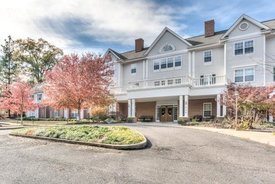Veterans Administration Aid and Attendance Pension program
The Veterans Administration Aid and Attendance Pension (A&A) program helps eligible low-income wartime veterans and their surviving spouses with the costs of assisted living, home care and skilled nursing home care. It’s for those who need daily assistance with various activities, such as medication management, bathing, dressing, transportation for errands and medical appointments and housekeeping.
A&A is an additional tax-free monetary benefit on top of a veteran’s basic monthly pension. Single veterans can receive as much as $1,794 a month, while surviving spouses receive up to $1,153 a month and married couples up to $2,127 a month. To qualify, a single veteran’s Maximum Annual Pension Rate (MAPR), set by congress, can’t exceed $22,577, and for married veterans it can’t exceed $26,766. For a more in-depth view of these calculations, please visit the veterans organization website.
Veterans must have served at least 90 days on active duty and at least one of those days must have been during a wartime period. Veterans must also meet some of these conditions:
- Be totally or permanently disabled
- Reside in a skilled nursing home
- Receive Social Security Disability Insurance (SSDI)
- Receive Supplemental Security Income (SSI)
- Require the assistance of another person to perform ADLs
- Have vision that’s limited to 5/200 visual acuity or less in both eyes
Widowed spouses must have been married to the veteran at the time of his or her death to be eligible.
Due to the many complexities involved with the obtaining the A&A benefit, it’s best to speak with a VA counselor who can guide you through the lengthy process and help you prepare and gather all the
necessary forms.
For more information, please call your local veterans office at (901) 222-4237.
Reverse Mortgage A
reverse mortgage is a type of home equity loan that enables seniors to receive cash on their home’s value without selling it, and it’s often used to pay for assisted living. Qualified accommodations include single-family residences, manufactured homes, 2-4 unit properties, condominiums and townhouses.
Getting a reverse mortgage doesn’t affect Medicare of Social Security benefits, however, the payments you receive from a reverse mortgage must be spent within the same month you receive them. Any funds remaining in your bank account could be considered an asset and affect eligibility for government programs.
To be eligible for a reverse mortgage:
- Seniors must be age 62 or older
- The home must be owned by the applicant and have equity
It’s not necessary for the borrower to pay back the loan until the home is sold or otherwise vacated. Borrowers may refinance the reverse mortgage if their home significantly increases in value, and If seniors, or their heirs, decide to keep the home, the reverse mortgage can be repaid.
For more information on reverse mortgages, go to the
National Reverse Mortgage Lenders Association to find a lender in Tennessee.








